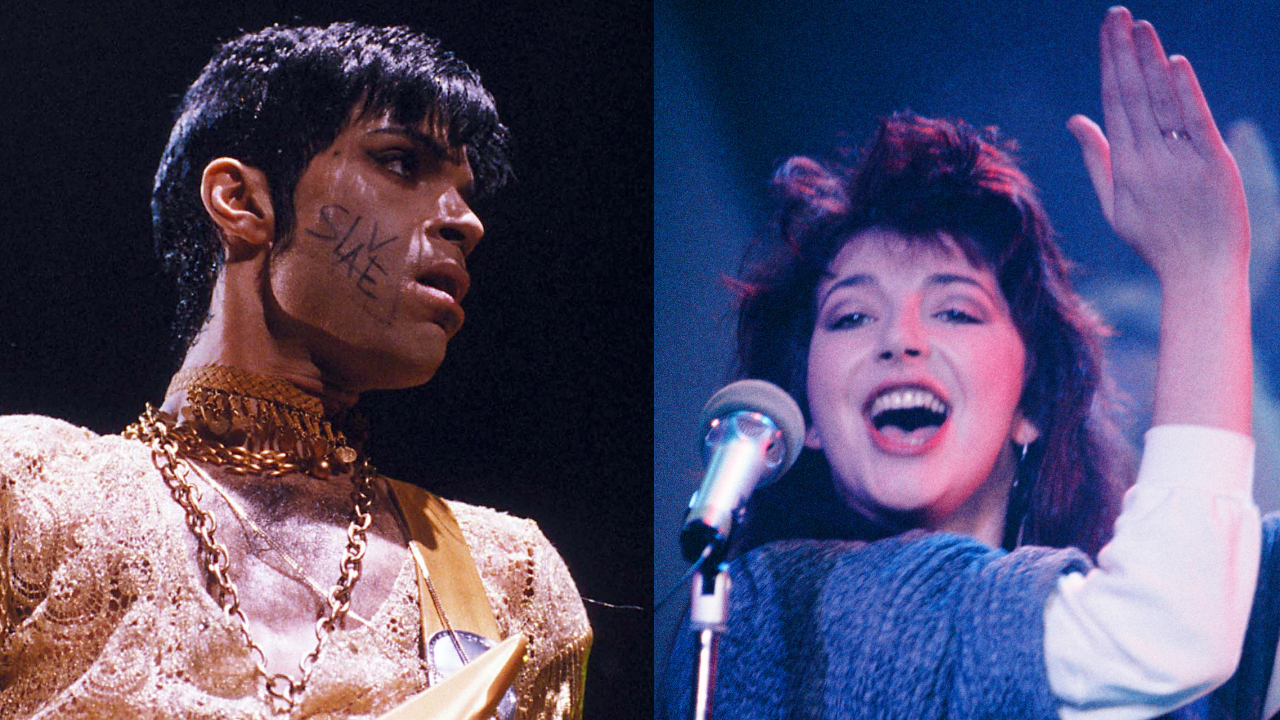A sped-up version of Aerosmith's Dream On is massive on TikTok: we've figured out why
Music fans on TikTok are listening to squeaky, super up-tempo takes of huge rock hits, including songs by Aerosmith, Ghost, The Cramps and more

Select the newsletters you’d like to receive. Then, add your email to sign up.
You are now subscribed
Your newsletter sign-up was successful
Want to add more newsletters?

Every Friday
Louder
Louder’s weekly newsletter is jam-packed with the team’s personal highlights from the last seven days, including features, breaking news, reviews and tons of juicy exclusives from the world of alternative music.

Every Friday
Classic Rock
The Classic Rock newsletter is an essential read for the discerning rock fan. Every week we bring you the news, reviews and the very best features and interviews from our extensive archive. Written by rock fans for rock fans.

Every Friday
Metal Hammer
For the last four decades Metal Hammer has been the world’s greatest metal magazine. Created by metalheads for metalheads, ‘Hammer takes you behind the scenes, closer to the action, and nearer to the bands that you love the most.

Every Friday
Prog
The Prog newsletter brings you the very best of Prog Magazine and our website, every Friday. We'll deliver you the very latest news from the Prog universe, informative features and archive material from Prog’s impressive vault.
Over the last few years, TikTok has played a huge role in helping fans discover new music, as well as giving them new ways to relate to the songs that are already part of their lives. Through countless trends – from artist covers to soundtracked dance routines – the video sharing platform has become a driving force behind what’s popular, and it’s having a direct impact on music charts globally.
Being a hotspot for creativity, trends can develop on TikTok in all sorts of unexpected ways, such as the outlandish craze in 2020 which saw users skateboarding and drinking cranberry juice to Fleetwood Mac’s 1977 classic Dreams.
One popular current trend involves speed-altered songs. Aerosmith’s 1973 hit Dream On was recently given a new lease of life on the platform, thanks to an obscure video game meme which featured God Of War: Ragnarok character Kratos dramatically plummeting off a cliff. The trend, which is typically used to portray someone diving into a situation they perhaps shouldn’t be, was first started in 2020, although didn’t become popular until it was soundtracked by Dream On in July 2022.
Following the song’s surge in popularity – the original Dream On has now been used in over 90,000 new videos – TikTok user Owen (0wenmcintosh) embraced the trend by posting a warp-speed version of the track in November 2022. Owen used the remixed song to soundtrack a self-made football video that saw him invite viewers to “dream on” in relation to the 2023 Ballon d'Or, the annual award given to the world's greatest player.
His clip amassed nearly three million views, over 300,000 likes, and its accompanying soundtrack has since been used in over 50,000 other creations. For the most part, the sped-up version is incorporated into videos that explore extraordinary “dream-like” concepts, such as otherworldly landscapes and holiday destinations, as well as aesthetic “glow ups” and house decor transformations.
Dream On isn’t the only track to have received this kind of remix treatment. In 2020, a viral trend emerged from an accelerated sample of another Aerosmith song, their 1979 cover of the Shangri-Las' classic Remember (Walking in the Sand), created by rap artist Kreepa for his 2019 song Oh No.
As the sample centred around the repetitive lyric “oh no”, the song was adopted to document unfortunate moments such a cat falling in a bathtub (netting almost 12 million likes), beauty treatments gone wrong (5.7 million likes), and a woman tripping over on a treadmill at the gym (2.4 million likes). Remarkably, "the Oh No song" became so popular on the app that it was used in over 19 million creations, serving as possibly the most viral example of the movement.
Sign up below to get the latest from Classic Rock, plus exclusive special offers, direct to your inbox!
Another instance of the phenomenon saw Swedish occult party rockers Ghost enter the TikTok spotlight after their 2019 7 Inches Of Satanic Panic track Mary On A Cross went viral courtesy of a fan-edit celebrating the hit sci-fi/horror series Stranger Things.
The popularity of the song on the app (the Mary On A Cross hashtag is attached to videos with almost two billion views), led to it becoming Ghost's most streamed song, with over 260 million listens on Spotify. It also sparked a snowball effect of users releasing their own speed-altered remixes, both high-speed and slow. The latter, which is most likely admired for its haunting and dramatic ambience, performed particularly well on the platform, and led the band – with the encouragement of their record label Loma Vista Recordings – to release it officially.
Similarly, The Cramps released their own sped-up version of 1981’s Goo Goo Muck, following its inclusion on Netflix’s new series Wednesday and subsequent viral success on TikTok.
While speedy versions of songs are hardly a new thing – accelerated samples were popularised by artists like Kanye West in the mid 2000s, a style reportedly coined “chipmunk soul” by musician and producer Questlove – the trend has undoubtedly been amplified via online spaces, and spans across multiple genres.
As TikTok’s Global Music Program Manager Clive Rozario explains, record companies are keen to piggy-back the trend’s immense popularity, (the ‘sped up song’ hashtag on TikTok has over 360 million views), and are actively working with artists to release their own sped-up remixes. “Labels and artists are embracing this. This is what we've seen in response to the fan demand; they want to promote the new adversities that take off."
Spotify have even curated a playlist dedicated to such releases – with over a million likes – featuring tracks by a wide variety of artists including Madonna, Lana Del Rey, Thundercat, Panic! At The Disco and Demi Lovato, among others.
Although interest in this kind of music is off the scale, the reasons for its popularity hasn’t yet been the subject of much academic research. But Emmelyne Jack, a PhD student in Neurology at The University of Melbourne, believes it most likely plays hand in hand with how our brains work when listening to any kind of music.
“Music, especially fast-paced music, elicits a lot of activity in the brain,” she tells Refinery29. “Music listening increases the release of a neurotransmitter called dopamine, the ‘happy hormone’ often associated with pleasure. Whenever we listen to a song we like (and we tend to like music with regular patterns, high tempos, and a bright contour) we are essentially rewarding ourselves on a neuro-chemical level.”
Social media usage works in similar ways, and rewards us with swift – although short-lasting – bursts of dopamine. TikTok's quick-fire process of content consumption supports this, offering millions of entertaining tidbits of content that users can rapidly scroll through. And the speed-warped songs on the platform suggest that audio on the app is catching up with its easily digestible, instantaneous use of visuals, where every-day moments are spliced into miniature, compact video fragments.
While the existence of sped-up songs make sense in the rapid environment of the online world, it might be harder to understand from a "traditional" music fan’s perspective. The accelerated reimagining of Aerosmith’s Dream On might not be welcomed by fans who feel it inappropriate to give a classic rock song squeaky vocals and a hyperactive, video game-esque pace.
TikTok’s Rozario, however, believes the popularity of sped-up songs might have something to do with fans wanting to connect with music in a faster, less complex way, allowing them to engage with the essence of a song without having to think too deeply about it. “I think when a song is sped up, you need less energy and less concentration because the connection with it is more immediate. You can connect very naturally very quickly, particularly if you're familiar with the song already.”
The TikTok audience’s relationship with music is clearly changing, with the ability to create content with a song perhaps more important than forming a personal bond with its original form. Part of this is most likely due to the platform’s endless creative options, where fans are encouraged to put their own spin on audio, rather than simply consuming it.
“They're feeling empowered to become part of the actual music making process” explains Rozario. “Experimenting with their own versions, their own remixes – sped up or slowed down – by interacting with the music itself, and engaging with the artists and the artist’s piece of work.
“Music fans come to TikTok to not just to consume music, but to creatively express themselves, connect with others and like-minded fans of those artists. It's a very active experience. And fans find it interesting and exciting to hear something they’re familiar with, but delivered in a new way; a new version of their favourite song.”
Although not all classic rock lovers may be thrilled to hear hits like Dream On reworked to sound as if Steven Tyler has swallowed a helium balloon, it’s mind-boggling to see how fans’ relationships with well-loved songs are evolving to meet the demands and trends of modern technology.

Liz manages Louder's social media channels and works on keeping the sites up to date with the latest news from the world of rock and metal. Prior to joining Louder as a full time staff writer, she completed a Diploma with the National Council for the Training of Journalists and received a First Class Honours Degree in Popular Music Journalism. She enjoys writing about anything from neo-glam rock to stoner, doom and progressive metal, and loves celebrating women in music.
